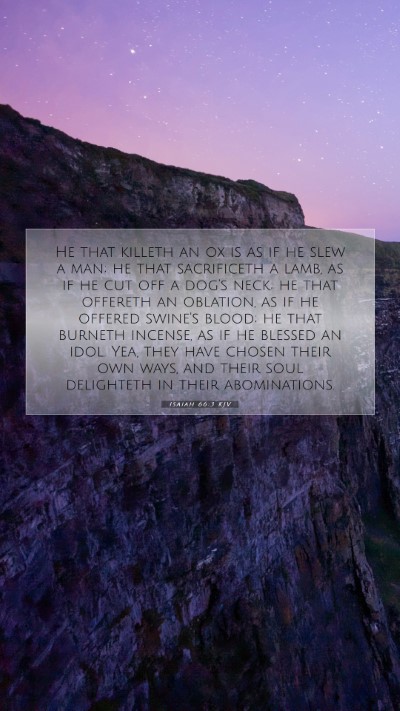Understanding Isaiah 66:3
Isaiah 66:3 is a profound verse that emphasizes the nature of true worship and the distinction between outward religion and genuine devotion to God. This verse reads:
"But he that killeth an ox is as if he slew a man; he that sacrificeth a lamb, as if he cut off a dog's neck; he that offereth an oblation, as if he offered swine's blood; he that burneth incense, as if he blessed an idol. Yea, they have chosen their own ways, and their soul delighteth in their abominations."
The Apostle Isaiah presents a challenge to the readers regarding the authenticity of their worship practices.
Bible Verse Interpretations
To apprehend the meaning of Isaiah 66:3, we can refer to various public domain commentaries. The insights from these sources clarify the theological implications and the moral lessons of this scripture.
1. Matthew Henry's Commentary
Matthew Henry emphasizes the idea that God seeks a heart dedicated to Him rather than mere ritualistic practices. He notes:
- Ritual vs. Reality: Henry argues that the rituals of sacrifice, if devoid of true reverence and sincerity, are meaningless.
- God's Displeasure: The verse illustrates God’s anger towards those who engage in empty rituals while pursuing evil desires.
- Profound Truth: Henry affirms that the sacrifices of the wicked are repugnant to God; thus, their outward actions cannot substitute for genuine faith.
2. Albert Barnes' Exposition
Albert Barnes provides additional clarity about the perverse nature of the actions described:
- Equating Rituals with Sin: Barnes highlights how the actions of sacrificial offerings performed without true worship are compared to heinous sins, indicating their spiritual vacuity.
- Judgment on Ritualism: The commentary reflects on the judgment where God rejects not only the actions but the individuals as well, who take delight in their sins.
- Core Issue: The core issue remains that the people had strayed from genuine piety into the mere performance of religious acts.
3. Adam Clarke's Commentary
Adam Clarke’s insights further delve into the cultural context of sacrifices:
- Irony of Worship: Clarke presents the irony that the act of worship, intended to honor God, becomes twisted into a representation of abominable practices when done from a place of disobedience.
- Symbolism of Animals: He explains the symbolic meaning of the animals chosen for sacrifices, showcasing the severity of comparing sacred acts to detestable scenarios.
- Call to Authenticity: Clarke emphasizes that God desires not the act of sacrifice itself, but the spirit behind it—a heartfelt commitment.
Key Themes and Meanings
This verse fundamentally questions the value of mere external observance of religious duties without the corresponding heart attitude. Here are some salient points:
- True Worship Defined: True worship is characterized by authenticity and alignment of one’s heart with God’s will.
- Rejection of Hypocrisy: God rejects actions that are only for show; He calls for integrity and genuine faith.
- Warning Against Idolatry: The passage warns its readers of the spiritual dangers of allowing anything but God to take center place in their lives.
Application in Daily Life
Understanding Isaiah 66:3 aids in applying its lessons to our lives:
- Sincere Worship: Ensure that your spiritual practices stem not from mere tradition but from a heartfelt relationship with God.
- Self-Reflection: Regularly evaluate personal motives behind religious practices to ensure they align with a genuine love for God.
- Rejecting Hypocrisy: Be aware of the dangers of hypocrisy in spiritual life; pursue an honest faith that influences both actions and heart.
Cross References
Isaiah 66:3 can be connected to several other significant passages:
- Isaiah 1:11-13: Discusses the futility of sacrifices performed without true repentance.
- Micah 6:6-8: Questions what God desires from His people, emphasizing justice, mercy, and humility.
- Matthew 15:8-9: Jesus quotes Isaiah regarding honoring God with lips while hearts are far from Him.
Conclusion
Through engaging with Isaiah 66:3 and its implications, one can better comprehend the deeper meaning of biblical worship. This verse serves as a reminder that God desires a relationship anchored in authenticity, and not mere external appearances. It prompts believers to investigate their motives and strive for genuine devotion—as a critical endeavor in one’s spiritual journey.


